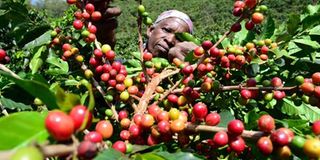Uhuru order on coffee big relief for farmers

A coffee farmer in Nyeri. President Uhuru Kenyatta’s order that all coffee licensing fees and levies be immediately waived is a big relief to farmers countrywide. PHOTO | FILE
What you need to know:
- The Kenya Planters Cooperative Union (KPCU) board of directors said the order is a good move that will enhance competition and break up vested interests which have seen farmers exploited for decades.
- They also wanted marketing, milling and pulping levies to be scrapped and replaced with competitive pricing for the services besides calling on the government to enact laws and policies that would transform coffee co-operatives into investment vehicles.
President Uhuru Kenyatta’s order that all coffee licensing fees and levies be immediately waived is a big relief to farmers countrywide.
Coffee production in Kenya has declined from as much as 150,000 tonnes per year in the 1980s to the 35,000 tonnes at the moment because of various challenges.
But while delivering his State of the Nation address in Parliament on Thursday, the Head of State said the move is aimed at increasing revenues farmers receive by four per cent.
Yesterday, the Kenya Planters Cooperative Union (KPCU) board of directors said the order is a good move that will enhance competition and break up vested interests which have seen farmers exploited for decades.
The President’s directive will also remove the exorbitant one million US dollar guarantee required to access the auction in Nairobi and enable farmers’ owned companies such as KPCU market its members’ coffee. It will as well give more buyers access to Kenyan farmers directly,” said Mr William Gatei, the KPCU board chairman.
Mr Gatei said the order could just be what the doctor ordered for the coffee sector. “Lowering barriers for sellers and buyers is just what coffee farmers have been asking for,” he said.
The President’s move came ahead of the conclusion of an investigation into the woes facing the coffee sector by a Presidential task force. Mr Kenyatta said he relied on the preliminary findings of the 19-member committee he appointed to look into the challenges facing the sector early this year.
The task force is chaired by Prof Joseph Kieyah assisted by Agriculture Principal Secretary Richard Lesiyampe. It draws members from the government and private sector. Lawyers Dann Mwangi and Morris Kaburu are the joint secretaries.
But even before it embarked on its work, farmers and coffee societies rejected the task force arguing it would not solve their problems because it was not the first time such action had been taken. They argued the President knew what needed to done to salvage the coffee sector.
Lobbies had proposed tax cuts and new measures to help breathe new life into the troubled industry.
Agricultural Industry Network chairman Edward Mudibo and Kenya Coffee Producers Association acting chief executive officer Humphrey Wafula had earlier complained that fees and taxes account for 35 per cent of the farmers’ total gross sale.
“Even the government passes its own costs to the farmers by making them pay for their own research (2 per cent ad valorem levy), Coffee Directorate (1 per cent) and Road Cess (0.8 per cent),” they had said.
They want statutory levies reduced from four to two per cent and coffee directorate levy from 1 per cent to 0.5 per cent. They also want the 2 per cent Coffee Research Fund and 0.8 per cent levy by Kenya Roads Board and 0.2 per cent County Levy scrapped.
They also wanta review terms and conditions of the marketing companies’ licences saying there are only 10 firms that buy Kenyan coffee. They wanted farmers allowed to participate in marketing of the produce.
“Whereas Vision 2030 encourages farmers to participate in value addition, the coffee regulations are encouraging the opposite,” they had said, adding that the rules, which require coffee unions to have a bank guarantee of Sh100 million to get a marketing agent permit are prohibitive and injurious to farmers.
“It is worth noting farmers are already paying the agriculture commodity cess. Why should they undergo many restrictions to sell coffee?” they said.
They also wanted marketing, milling and pulping levies to be scrapped and replaced with competitive pricing for the services besides calling on the government to enact laws and policies that would transform coffee co-operatives into investment vehicles.
They also called for the review of existing coffee regulations to give farmers “marketing autonomy, increase number of coffee brokers and establish a safety net for the farmers.”
However, tea and sugarcane farmers took offence, accusing President Kenyatta of “sidelining” them.
“The coffee sector seems to be getting preferential treatment yet the government has constantly ignored us,” said Mr Richard Ogendo of Kenya Sugarcane Growers Association.
“They have even denied us funds for servicing factory machines at Chemelil and Muhoroni sugar mills, leading to breakdowns and disruption of services,” said the union secretary general.
Mr Ogendo said despite the fact that the sugar sector injects Sh12 billion to the exchequer yearly, suggested ways of bettering its performance are not treated as urgent by the government.






